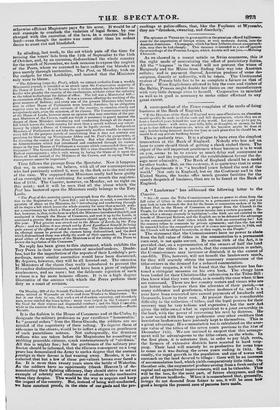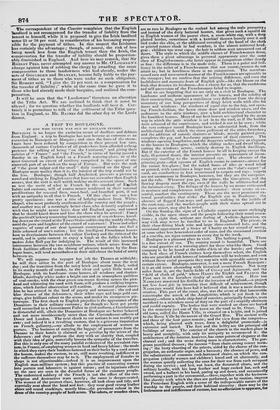A "Landowner" has addressed the following letter to the Courier.
" Sir—It seems the Tithe Commissioners have no power to abate from the- full value of tithes in the commutation to a permanent corn-rent ; and you may look in vain through the Act for the bonus or concession spoken of by Sir Robert Peel in the House of Commons as proper from the Church to the People, for the exchange of a precarious income Into a certain payment. Be- sides, what a strange anomaly in legislation !—the Irish are not entitled to the - benefit of Municipal Reform, and the English are to be debarred the advantage in the commutation of their tithes which the Irish are contending for ! Let the country refuse to commute by private agreement; and then the Act will be amended before the compulsory part of it comes into operation in 1838, and the Church will be obliged to concede, as they ought, to the People." The statement that the Commissioners have no power to abate from the full value of tithes in the commutation to a permanent- corn-rent, is not quite correct. By section 38th of the Act, it is- provided that, on a representation of the owners of half the land and half the tithes in a parish, that the commutation is unfair, the Commissioners may increase or diminish it to the extent of one-fifth. This, however, will not benefit the landowners much, for they will scarcely obtain the necessary concurrence of the tithe-owners in the demand for a reduced commutation.
In other respects, it will be found that the landowner has fas- tened a stringent measure on his own back. The clergy have been lauded for their Christian-like submission to the Tithe-Bill : they knew what they were about, as is usually the case when tithes- are concerned. There are few country rectors and vicars who are not better tithe-lawyers than the attornies of their parish,—as many noblemen and gentlemen, whose moduses of Gs. and 7s. a year have been converted into annual payments of hundreds and thousands, know to their cost. At present there is considerable. difficulty in -the collection of tithes, and the legal process for their recovery may be very tedious and expensive ; but the new Act. gives the tithe-owner what is equivalent to a joint ownership in the land, with the power of recovering his rent by distress. He is now vested with the same preference over other creditors that heretofore landowners have jealously kept to themselves. This is a great advantage. His commutation too is calculated on the aver-. age value of the tithes of the seven years previous to the 31st of December 1835. We are inclined to suspect that this arrange- ment will be advantageous to the tithe-owner, on the whole. In the first place, it is notorious that, in order to pay high rents,. the farmers of extensive districts have resorted to hard crop- ping. Their land will scarcely be so productive for some time to come as it was during the seven years ending in 1835. Se-
condly, the rapid growth in the population and size of towns will
encroach on the land derived to tillage: there will be an increase of accommodation land, which yields comparatively little tithe. On
the other side, the augmented produce arising from a fresh outlay of- capital
and agricultural improvements, will not be titheable. This will be the loss, for the most part, of future clergymen, and the gain of future landlords. When it is remembered that, generally, livings do not descend from father to son, it will be seen how good a bargain the present race of parsons have made. The correspondent of the Courier complains that the English landloid is not recompensed for the transfer of liability from the tenant to himself, while it is proposed to give the Irish landlord some 25 or 30 per cent, in consideration of his becoming respon- sible for the payment of tithes. In this respect the Irishman as certainly the advantage ; though, of course, the risk of loss being much less from the English tenant than the Irish, the compensation for the transfer of liability should be proportion- ably diminished in England. And here we may remark, that Sir ROBERT PEEL never attempted any answer to Mr. OlontmEN's charge against him of robbing the clergy by awarding the same compensation to those landowners who had already, under the acts of GOULBURN and STANLEY, become fully liable to the pay- ment of tithes as to those who were under no such obligation. Sir ROBERT said, "I give the 25 per cent, as a compensation for the transfer of liability ;" while at the same time he gave it to those who had already made their bargains, and realized the com- pensation.
It will be seen that the "Landowner" threatens an alteration of the Tithe Act. We are inclined to think that it must be altered ; for we question whether the landlords will bear it. Cer- tainly it is premature to talk of the settlement of the Tithe ques- tion in England, as Mr. BAINES did the other day at the Leeds dinner.



























 Previous page
Previous page